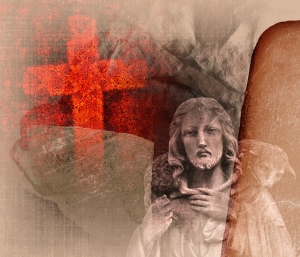
(In my book about LGBT Christians I’ll be including this letter, which I got in last week. If you can come away from reading this still believing that it’s impossible for a person to be both fully gay and fully Christian, then all I can say is that I hope your lobotomy didn’t leave behind too unsightly a scar.)
Dear Mr. Shore,
I was once a proud African Methodist Episcopal Zion (AME Zion) Christian, the evangelical son of an AME Zion preacher, ready to answer the call of a life in ministry. Once I claimed the faith of my father as my own, I felt a denominational identity was too constricting. I simply called myself an evangelical Christian. This, despite the fact that I was tremendously hurt and confused by the near daily abuse I suffered at the hands of Christian school classmates, who taunted me with “faggot,” “girly,” “gay-gay,” etc.
Clearly, everyone else had figured out my sexual orientation before I had. When I thought about the fact that, unlike my 13-year-old counterparts, I didn’t seem to be interested in girls, that in fact I longed to be close to and have sex with boys, I immediately reasoned, “But I can’t be gay, because Christians aren’t gay, and I’m a Christian!”
It was just a phase. I couldn’t be gay.
This “phase” lasted several years (despite desperate pleas to an almighty God who would no doubt free me of this “sin” that I wanted no part of anymore than He did). After struggling with a four-year addiction to gay porn, in my senior year of college I was forced to acknowledge that this must be more than a mere phase. I did what any good evangelical Christian would: I sought help. After a night of binging on porn, I tapped out the words “gay and Christian” on the keyboard, and came across Exodus International, a ministry dedicated to helping men and women overcome “unwanted same-sex attractions.”
Initially, discovering Exodus gave me hope and encouragement. I went along under the notion that this was no phase, but that it was manageable, and conquerable. I dove into ministry: Bible study founder/leader in college, president of the Christian group at pharmacy school, volunteering with the youth ministry at my local Assembly of God church.
Yet the more I explored my sexual attractions, the more dismayed I became. I fervently desired a Godly relationship with a woman, to be a dad; I yearned to live the evangelical, American dream.
What I could not shake, though, was the debilitating loneliness that overshadowed every aspect of my life—despite a loving family, a wonderful girlfriend, a supportive ex-gay community, an adept counselor, great accountability partners, service to others, leadership in ministry, a local church community, incessant prayer, indomitable determination, and innumerable ex-gay resources. As I became increasingly aware of my unchanging orientation, the insufficient satisfaction of opposite gender intimacy, and the idea that this meant a lifetime of misery without true companionship, my depression and anxiety grew, until I was ready for God to just take me home.
I simply did not want to exist anymore, and begged God to have mercy on me by ending this.
I wish I could say that my Christian community responded in Christ-like ways to me when I revealed my “struggles with same-sex attraction.” And there surely were those who incarnated Christ to me. But more commonly the responses ranged from indifference to muted disgust (and everything in between).
In one pivotal encounter, I had lunch with the youth pastor at my Assembly of God church. I was sharing with him my disappointment with the way in which my revelation was received by the other young adults in the church with whom I was desperate to bond (after all, the ex-gay mantra was that “healing comes by forging healthy, same-sex relationships”). I bemoaned the fact that some of those in whom I had confided were nonplussed, some cool but silent (leaving me to wonder where I actually stood with them), and yet others took it upon themselves to preach to me, thinking that an “encouragement.”
What was my pastor’s response to my discouragement? He spent ninety minutes chiding me for being upset, and preaching to me about the evils of homosexuality. The obvious offense (treating me in a manner expressly as I had just complained about being treated by others) was only magnified by the fact that he was well aware of my dad’s ordination in ministry, my years spent in Bible classes at Christian schools, and my extensive knowledge of scripture. Perhaps most damaging of all was his insistence that I no longer serve with our church youth group (which he had originally mandated prior to our lunch date). I cannot express how belittled and useless I felt. My love for God, my gifts, my talents counted for naught so long as I had difficulties dealing with my sexuality. I left lunch that day feeling more disparaged than when we started.
I was never an evangelical after that. In fact, here I stand, six years later, and there are times when it is difficult for me to associate myself with Christianity at all. After hearing my protracted story, religious and irreligious people alike often ask me in befuddled exasperation: “How are you still a Christian? Why do you still go to church?!” And frankly, I have yet to articulate a satisfactory answer. As best I can tell though, it is rooted in my abiding love for Jesus. I am compelled by the life and teachings of Jesus. I strive to live The Way of Jesus, and to bring the Kingdom of Peace and Love here to earth. And yet every day it is a struggle to hold onto that shred of faith, when so many other self-proclaimed Christians adamantly declare my apostasy and condemnation to hell for daring to love in the way that comes naturally to me. (The more enlightened folks are civil enough to quietly suggest I’m “not in God’s will,” and to let me know that they are praying for me to see the light and truly know Him.)
I profusely thank God for the emerging church I discovered around the time of that fateful lunch with my pastor. Up until that point, I had a subtle but nagging twist in my gut at every church I had ever attended. It was from experiencing such love and comfort at this new church that I was finally able to verbalize what I felt all those years: that I was not safe and accepted as I was. At last, I was blessed to have been led to a community of believers who would walk alongside me, instead of ahead of me; who would ask questions with me, instead of dictating beliefs to me. It was within this community that I was able to salve the wounds of bitterness and jadedness that had pervaded my soul.
I don’t know that I’ll ever be an evangelical again. I’m not sure if I can even maintain the identity “Christian,” given all the baggage that seems to accompany the word. All I know is that I hope for the day when I can be seen by the Church as being equal to all others in the Body of Christ, and worthy of sharing my gifts in faithful service—not despite my sexuality, but because I am a gay Christian, beloved of God.












